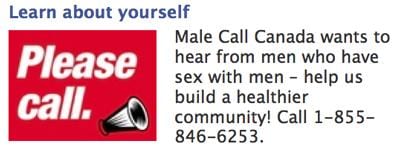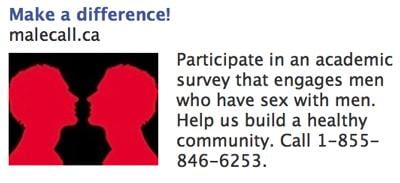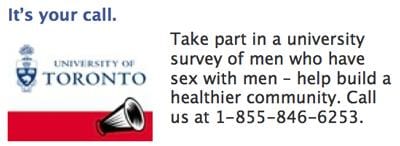

These three ads were all rejected by Facebook because they target men based on their sexual orientation.
A controversial and confusing policy led Facebook to ban advertisements about an academic study investigating the attitudes of men who have sex with men and then to reinstate the ads following an investigation by Xtra.
Ted Myers is conducting a phone survey called Male Call Canada and needs men who have sex with men to call a 1-800 number to answer questions about their attitudes toward sexual health and behaviour. He wanted to advertise on Facebook to get the word out.
But shortly after the advertisements went live on Facebook they were pulled, and Myers received notes saying they violated Facebook’s policy regarding online dating ads and ads that imply Facebook knows a user’s personal data. Male Call Canada’s advertising consultant says he was warned his account would be suspended if he attempted to resubmit the ads.
Facebook’s advertising guidelines state that while it’s possible for an advertiser to target ads to users with certain characteristics, it’s forbidden to suggest that the advertiser knows the user has those characteristics.
So an ad targeted to gay men can say “Gay dance clubs,” but not “meet other gay men” because it implies that the advertiser knows the user is gay.
But the Male Call ads didn’t fall into this category. One rejected ad said:
“Male Call Canada is an academic survey of men who have sex with men. Help build a healthier community. Call 1-855-846-6253.”
A sales rep initially said the ad was banned because it had the words “men who have sex with men,” noting that Facebook doesn’t allow ads to call out a user’s sexual preference. However, this claim is contradicted by Facebook’s own ad guidelines that explain how ads can be targeted to gay, lesbian, bi and trans people.
Male Call spent two weeks trying to get the ads reinstated, explaining that the term “men who have sex with men” is necessary to include bisexual men and those men who don’t identify as gay but have sex with men.
All of Male Call’s efforts to get the ads reinstated were rebuffed by staff at Facebook, who threatened Male Call’s ad rep with account termination.
“We reserve the right to determine what advertising we accept, and we may choose to not accept ads containing or relating to certain products or services,” reads a Nov 9 email to Male Call from a Facebook online sales rep, obtained by Xtra. “We will not allow the creation of any further Facebook ads for this product and appreciate your cooperation with this policy.”
Myers says the policy sounded like discrimination against a gay service, which was particularly troubling “given the important role that Facebook and all social media play in the lives of gay, bisexual and other men who have sex with men in Canada.”
Facebook did not make any further responses to Male Call’s inquiries, but Xtra attempted to contact Facebook to investigate its complaint on Nov 22. After Xtra gave details about the nature of Male Call’s complaint to Facebook’s manager of public policy communications, Facebook stopped returning emails.
Then at midnight on Nov 24, Male Call received notice that Facebook had reviewed its advertisement and decided it had been rejected in error.
“It appears most of the ads in your campaign “Male Call Canada NOV” were mistakenly disapproved. However, they’ve now been re-reviewed and approved. Sorry for any inconvenience,” reads the email from Facebook Global Marketing Solutions.
Male Call’s advertising consultant credits Xtra‘s investigation with getting Facebook to reverse its decision.
“I wouldn’t be surprised if your attempts to contact them is what resolved this,” Clayton Partridge says.
The ads were back up on Facebook by the morning of Nov 24. Male Call’s advertising consultant says the ads have already proven very effective, generating six calls to the survey in the first hour and a half the ad was running.
Unfortunately, the survey has missed out on two weeks’ worth of responses to the ad. That’s significant, because Male Call is trying to collect the widest possible survey of men’s attitudes in order to better inform health services and prevention campaigns in all regions across Canada.
“We’re moving beyond a behavioural survey, and we want to talk to men about what the current issues are within the gay community, and related to HIV and AIDS,” Myers says. “It’s a survey that’s attempting to understand men who have sex with men. We want to understand some of the attitudes behind the behaviours that we’re starting to see.”


 Why you can trust Xtra
Why you can trust Xtra


